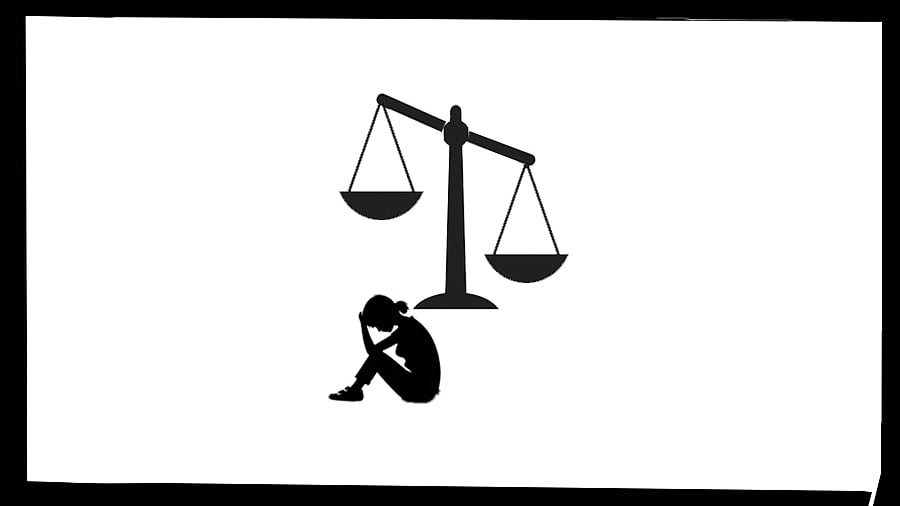
India’s legal system is confronting a profound yet under-recognised crisis: the criminalisation of women who retaliate after enduring prolonged domestic abuse. While protective laws exist, the same system often punishes women when they act in fear or desperation. These are not premeditated crimes but responses shaped by years of trauma, ignored pleas for help, and systemic, institutional failures.
According to the National Family Health Survey-5 (2019-21), nearly one in three Indian women has experienced spousal violence. Yet, less than 10 per cent report it, and even fewer access meaningful legal recourse. The Protection of Women from Domestic Violence Act (2005) was a significant legislative step, but its implementation remains inconsistent. Overburdened protection officers and dismissive law enforcement often trivialise domestic violence as a private matter, especially when perpetrators are influential.
Compounding the issue is the alarming lack of official data on women who commit crimes, particularly homicide, in the context of sustained abuse. The National Crime Records Bureau (NCRB) tracks crimes against women but does not account for retaliatory acts by women in abusive relationships. This omission erases the psychological and social context of these actions, reinforcing a justice system that processes trauma through a narrow, punitive lens.
Globally, the pattern is better recognised. A study by the National Coalition Against Domestic Violence (USA) found that 72 per cent of women who kill their intimate partners had been abused by them. The American Psychological Association reports that a significant portion of incarcerated women acted in direct response to abuse.
In India, numerous accounts have emerged, many from investigative journalists, of women filing multiple police complaints, obtaining restraining orders, or seeking shelter, only to be sent back into dangerous homes. When these women are pushed to the brink, their responses are rarely calculated; they are acts of survival.
Repeated abuse doesn’t just bruise the body; it rewires the brain. Survivors of long-term domestic violence often suffer from complex Post-Traumatic Stress Disorder (PTSD), emotional dissociation, loyalty to the abuser, and learned helplessness. As psychiatrist Dr Judith Herman notes in Trauma and Recovery, such survivors may seem emotionally numb, offer inconsistent testimony, or even defend their abuser, all classic signs of psychological captivity, yet easily misread in court as deception or guilt.
In India, terms like “coercive control” which encapsulate patterns of manipulation, isolation, and domination, are still absent from legal statutes. Similarly, the concept of Battered Woman Syndrome, a defence recognised in jurisdictions such as the UK (R vs Ahluwalia) and US (State vs Kelly) acknowledges that violence may be a rational response to cumulative abuse.
Legal provisions fall short
The Bharatiya Nyaya Sanhita (2023) offers certain legal provisions that may be invoked in cases involving violence committed under extreme circumstances. These include Section 37(2), which provides for private defence; Exception 1 to Section 101, which addresses acts committed under grave and sudden provocation; and Section 367, which deals with mental unsoundness. These clauses acknowledge some extenuating factors but fall short of addressing the complex psychological and emotional realities faced by survivors of prolonged domestic abuse. The law continues to expect rational, immediate responses from individuals trapped in irrational, life-threatening situations. In the absence of consistent legal precedent and widespread trauma literacy among legal professionals, many women find themselves subjected to further injustice by the very system meant to offer them protection.
There have been isolated judicial acknowledgements. In Manju Lakra vs State of Assam (2013), the Gauhati High Court reduced a woman’s murder conviction to five years’ imprisonment after recognising sustained abuse. In Suyambukkani (1989), the Madras High Court invoked nallathangal syndrome, a localised understanding of psychological collapse due to extreme abuse to commute a murder sentence.
These cases, however, are outliers. Indian jurisprudence lacks a unified trauma-informed framework to address such realities. Until such a framework exists, decisions will remain ad hoc, leaving justice to chance.
Establishing a trauma-informed, survivor-centred justice system in India necessitates comprehensive reforms. Key measures include mandatory training for judges, prosecutors, and police officers on the psychological impacts of prolonged abuse; admission of expert psychological testimony to elucidate trauma, coercive control, and mental states; implementation of protective measures during trials to prevent re-traumatisation, particularly during cross-examinations; and recognition of historical abuse as a significant factor influencing motive and culpability.
Institutionalising the role of domestic violence specialists within the justice process is crucial. These experts can assist legal professionals in identifying patterns of abuse, comprehending survivor behaviours, and recommending trauma-informed interventions.
India’s constitutional framework reinforces these imperatives. Article 21 guarantees the right to life and personal liberty, which the Supreme Court has interpreted to include the right to a fair, just, and reasonable trial. Article 14 ensures equality before the law and equal protection of the laws, mandating that all individuals, regardless of their circumstances, are treated equitably within the legal system. Furthermore, as a signatory to the International Covenant on Civil and Political Rights (ICCPR), India is obligated to uphold the right to a fair trial, as enshrined in Article 14 of the ICCPR.
Women who act after enduring years of abuse are not threats to society; they are testaments to systemic failures. Justice must evolve to hear the silence behind their actions, the desperation behind their delays, and the trauma behind their testimonies. Until our legal system embodies this understanding, countless women will continue to suffer, not only at the hands of their abusers but also under the scrutiny of a legal system that fails to acknowledge their truth.
(The writer is a lawyer, international justice sector expert, and the Executive Director and Co-founder of the Centre for Law and Transformative Change)